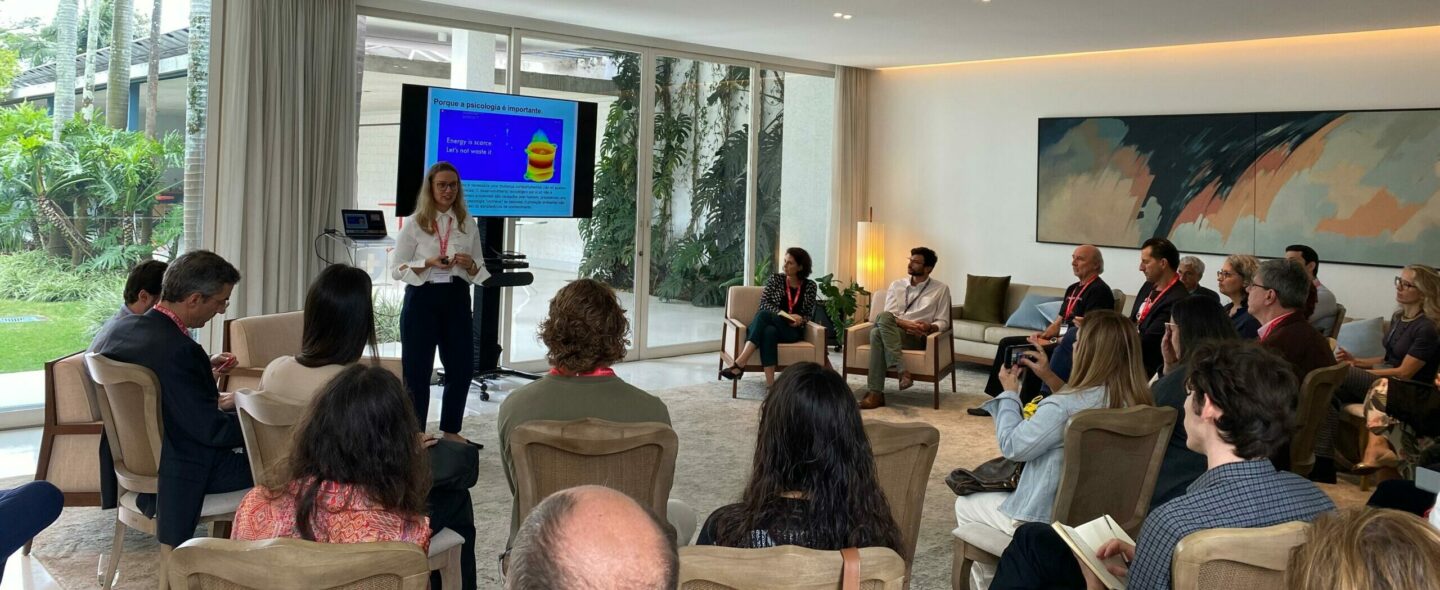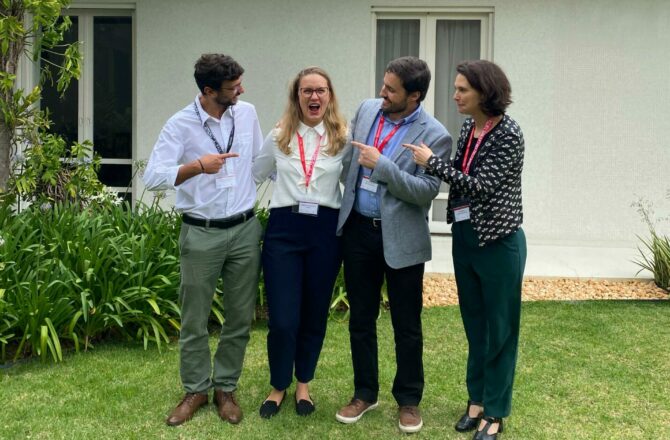
Cathérine Hartmann
We have the pleasure of welcoming Cathérine Hartmann from the ZHAW School of Applied Psychology Psychological Institute to spend a few weeks between our offices in Rio de Janeiro and São Paulo. Cathérine is in Brazil for a Mobility Exchange Program, intending to extend the professional network and strengthen international cooperation by deepening her research and creating new connections in Brazil.
As an environmental and sustainability psychologist, Cathérine Hartmann is interested in changing individuals’ daily behavior for a sustainable and just future. She will focus on the Brazilian setting in academia and business, wherever the human-related impacts for a transformation towards a more sustainable future emerge in mobility, food, energy, waste & recycling, etc.
The event “Talks @ Swissnex with Cathérine Hartmann” in São Paulo was the perfect kickoff of her time in Brazil. Researchers, including professors, students, and industry representatives, joined the discussion, allowing Cathérine to connect with the Brazilian ecosystem.
Read the interview below to learn more about her views on challenges and opportunities in Brazil.
For me, Brazil is one of the most diverse and colorful countries on this planet. I know it already from some visits before, it is rich in culture and nature – and in terms of natural resources, Brazil has literally what sustains human beings on earth – the green lungs. To me, it is central, and it should be all our concern to preserve it. Therefore, I see it as very fitting to work with research and practice partners here on-site to see where individual and collective behaviors and daily decisions that are related to sustainability issues are involved and where they can be supported and motivated to behave in a more environmentally friendly way.
I am passionate about issues related to sustainability – willing to work and engage with other people involved and making our planet a better place. I care about our environment and keeping it such a wonderful place as it is and making it even better. This also involves getting to know more people from various disciplines and starting international collaborations. During my research trip, I want to get in contact and engage with interested researchers, lectures, startup founders, consultants, and many more who deal with sustainability issues and challenges and who have identified (or not yet :)) that the most valuable component in sustainability transformation is the human being and that it is worth it getting more involved in the topic “changing people’s behavior for a sustainable development”.
Climate change is a civilizational problem, and many environmental and sustainability problems are human-made. This is the same everywhere, across countries and cultures, and is the case for Brazil as well as for Switzerland. It gives me a positive feeling that environmental and sustainability psychology can make a valuable contribution to the challenges we are facing because Psychology “knows” the human being, and based on this, it is possible to start working on the necessary behavior changes and associated programs or campaigns towards sustainable development. However, while globally seen people are responsible for the general issue, they might differ regarding their cultural and social background. There might be differences in the worldviews towards a healthy planet, in attitudes, environmental awareness, and available knowledge on how to act. For me, it is important to learn these particularities in order to then use the tools that exist in my research area to develop good behavioral change campaigns.
In order to develop these valuable ideas and then campaigns, a good and working infrastructure (e.g. a functioning public transport system) is a so-called basic requirement, otherwise any behavior change campaign, no matter how good, will not be very effective. This might be a challenge I see in this context, but I believe in the creativity and potential that comes from the people! Where there is a will, there is a way!
I am hoping for a steep learning curve since the conditions and surroundings to build and implement projects will probably be different, new, and culturally diverse, and I am very excited to learn and adapt. What works in Switzerland does not necessarily work and succeed in Brazil and vice versa, but I want to figure out the common ground and work on solutions for innovations in sustainable development.
In the beginning, I assumed that my mainly quantitative-focused research methods would go in a more explorative and qualitative direction to understand new areas and topics. Precisely because Brazil is such a large and diverse country and has such a great natural heritage, I will explore where I can start to include my knowledge but also learn from the various local communities in urban and rural areas.
Nevertheless, I hope to share my experiences from past and present projects where I focused on sustainable behavior change with interested parties to then develop new methodologies that are of value to both parties.
Briefly speaking I would like to share my insights and knowledge, listen and learn from others, think and discuss specific research and teaching project ideas, take part in events related to sustainability topics, see how work is done with and within faculties and enterprises – and be inspired by other mindsets and cultural perspectives.
I would like to travel back home with the feeling that new collaborations can now continue to grow, a common understanding has been reached, new joint actions are emerging, and the possibility to expand is present.
"For me the field trip was already a success and continues to be, since I have everyday “aha” moments – regardless while being in contact with researchers and businesspeople or just exploring and engaging with the city, nature, and the population."
Environmental psychology per se is an interdisciplinary research area, which makes it connectable to many other disciplines. I wouldn’t exclude interested people who are willing to work on solving the urgent sustainability challenges with me, but rather invite environmental engineers, architects, economists and ecologists, teachers, communication and health-issue experts and highlight that this is only a small excerpt from possible connecting disciplines.
I value practical insights (and would share mine in return) from Brazilian projects that work closely with companies, startups, and the public sector and have an impact on civil society. Any researcher or/and practitioner who, in the course of his or her daily work, is confronted with issues in which human sustainable or unsustainable actions are crucial and in which human beings are a decisive component in the improvement of the outcome, that’s a reason to connect with me! I will be available in Rio during the last week of November as well as via LinkedIn.
Cathérine Hartmann

